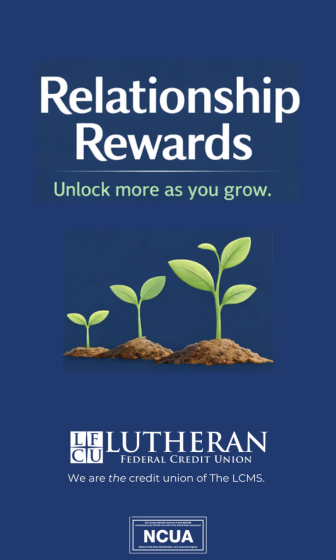By Stacey Egger
On Oct. 13 and 14, the LCMS Board for National Mission (BNM) convened in St. Louis to hear updates on the shifting structure and leadership in the Office of National Mission (ONM), hear reports from LCMS leaders and discuss items related to the upcoming Synod convention.
The BNM also welcomed a new member: the Rev. Sawyer Meyers, pastor of Beautiful Savior Lutheran Church in Olive Branch, Miss.
Preparations for convention
The Rev. Kevin Robson, LCMS chief mission officer, updated the board on the national and international work of the Synod, including the wrap-up of district conventions and the Synod’s preparations for its national convention, which will be held in Milwaukee in July.
The board voted to select the Rev. Dr. Steven Briel, BNM chairman, as advisory delegate to represent the board at the convention.
In preparation for the convention, the board voted to schedule an additional meeting for Dec. 2 to be held virtually, as well as a tentative follow-up meeting Jan. 9, to discuss overtures regarding the mission priorities of the Synod, as called for by 2019 Res. 4-04A. The language of the overtures is being prepared by the Joint Mission Assessment Committee, a subcommittee comprised of two BNM members and two members of the LCMS Board for International Mission. The committee will take into account feedback gained by the boards’ visitations with leadership from each of the Synod’s districts in the fall and winter of 2021.
The BNM also voted to establish a new BNM Policy Committee to review and write policy for consideration by the full board in three areas: ends policies, self-governance policies and executive limitation policies. Discussion of this new committee centered around the greater efficiency of writing policy at the committee level, which can then be edited and discussed by the full board.
Leadership changes in the ONM
The board was also apprised of recent changes in structure and leadership in the ONM under the establishment of three interim managing directors, each of whom will oversee a portion of ONM’s 23 mission areas. Deaconess Dr. Tiffany Manor (director of LCMS Life Ministry) will oversee the ministry areas related to human care and ministerial support; the Rev. Michael Meyer (director of LCMS Disaster Training) will oversee the ministry areas related to congregations and districts; and the Rev. Dr. Mark Wood (director of LCMS Witness & Outreach Ministry and LCMS Revitalization) will oversee ministry areas related to church planting, renewal and support.
Manor, Meyer and Wood each gave a presentation to the board on the work in these areas.
Manor’s presentation to the board included:
- The ongoing search for a director of LCMS Health and Family Ministry;
- The installation of the Rev. Brian Heller as the new manager of Specialized Pastoral Ministry, the Synod’s civilian chaplaincy program;
- The work of the Soldiers of the Cross and Veterans of the Cross grant programs to care for current and retired LCMS church workers;
- The ongoing Million Dollar Life Match grant program of LCMS Life Ministry, which has awarded over 100 grants to congregations to help them continue and expand their pro-life work, and which opened a third phase of applications on Nov. 1; and
- Life Ministry’s increased engagement with the network of people across the Synod doing life ministry work at the local level: “The greatest opportunity we have is with this network,” said Manor.
Meyer’s presentation to the board included:
- Updates on the Synod’s 180 Recognized Service Organizations (RSOs) and improvements in the process that manages their relationship with the Synod;
- The retirement of Dr. Rebecca Schmidt, who has served as the director of LCMS School Ministry since 2018; and
- Recent disaster response in partnership with several Florida RSOs in the wake of Hurricane Ian, and the work of LCMS Disaster Response to more effectively keep track of their assets across the country, including a network of over 6,000 trained volunteers.
Wood’s presentation included:
- Updates on a self-study version of the Every One His Witness evangelism program, which was developed in response to pandemic shutdowns but has continued to garner buy-in and currently has 1,337 registered users;
- Congregational use of resources created by LCMS Revitalization, including over 200 congregations that have gone through the Congregational Assessment of Development/Decline Status (CADDS) self-assessment program; and
- The progress of the church-planting initiative, a process-based approach for planting Lutheran churches that will train its first cohort in early 2023.
‘The Lord has His flock’
The board also heard from LCMS President Rev. Dr. Matthew C. Harrison.
Harrison reported on the “stellar” work of the district conventions — “good conversations across the Synod about all kinds of things”; significant recent donations to the Synod’s church-planting initiative; and a recent meeting of the Concordia University System presidents — “the strongest group of university presidents that we’ve ever had.”
Harrison answered a question regarding debates about women’s ordination in the Japan Lutheran Church (JLC) and the Australian Lutheran Church.
“The Lord has His flock. His will will be done,” said Harrison, after summarizing the ongoing debates in Australia and the 2021 decision of the JLC to ordain women — over which a cessation of altar and pulpit fellowship with the JLC will be brought before the Synod convention this summer.
Harrison also answered a question regarding the church’s response to current cultural and political rhetoric that may be unscriptural. While those promoting schools of thought such as critical race theory within the church are well-intentioned, he said, “I fear that the philosophy finally will take us far afield from where the Scriptures are. The challenge is really for us to continue to articulate a theology of Law and Gospel.
“The great equalizer is the Law, and the great equalizer is the Gospel. … The mission is for all people in all places. The blood of Jesus … cleanses us from all our sin … and each person is as valuable as the blood of Christ. How do we articulate that in a day and age that is so conflicted? … We have to be careful because the Bible doesn’t give us all the political answers. …
“The challenge is, if we don’t speak to the issues, we’re unclear for our own people; if we do speak to the issues, we divide our people. But you can’t not speak.”
The board’s next regularly scheduled meeting will be held Feb. 9–10 in St. Louis.
Meeting minutes, when they become available, will be posted at lcms.org/board-for-national-mission.
Posted Nov. 16, 2022/Updated Nov. 17, 2022





The challenge is, if we don’t speak to the issues, we’re unclear for our own people; if we do speak to the issues, we divide our people. But you can’t not speak.” I disagree. Rather, if we don’t speak, others will speak, claiming to speak for us. If we speak, but not according to the whole counsel of God, THEN we divide our people. We should not be speaking REACTIVELY when the Lord has given us the most PROACTIVE message possible. The pure Gospel breaks down the walls of separation. Ephesians 2:14–16 (ESV): For he himself is our peace, who has made us both one and has broken down in his flesh the dividing wall of hostility by abolishing the law of commandments expressed in ordinances, that he might create in himself one new man in place of the two, so making peace, and might reconcile us both to God in one body through the cross, thereby killing the hostility.